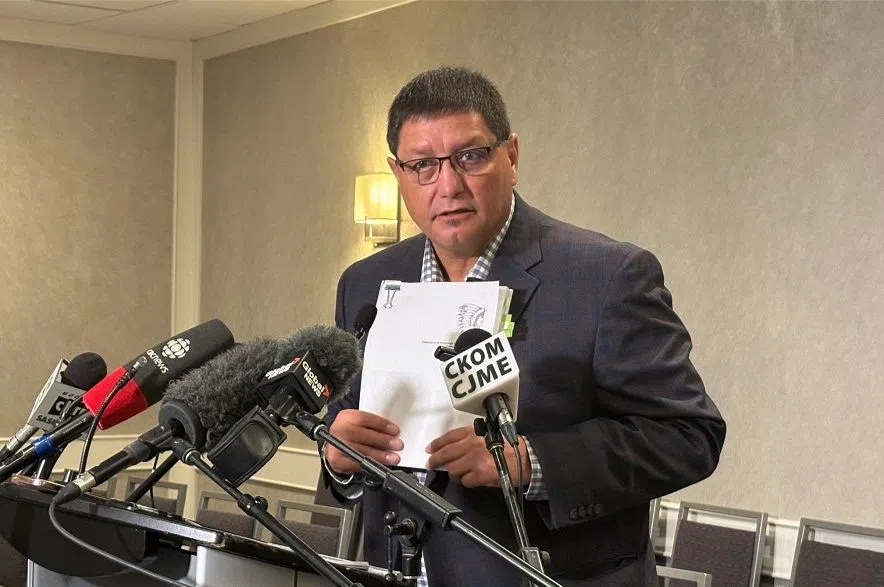There’s been radio silence from the Federation of Sovereign Indigenous Nations (FSIN) since a federal audit was released, according to Saskatoon Tribal Council Chief Mark Arcand.
“This is probably one of the biggest scandals in First Nations history,” said Arcand.
Read more:
- FSIN audit questions over $34 million in expenses
- Audit of Saskatchewan First Nations group questions millions of dollars in spending
- FSIN forensic audit released, transparency recommendations made
He continues the call for transparency and accountability from FSIN, an organization that represents 74 First Nations in the province.
On Wednesday, Indigenous Services Canada released its finalized report, flagging $34 million in expenditures.
The KPMG audit, which covered April 1, 2019 to March 31, 2024, revealed questionable, ineligible, or unsupported spending that included funds related to COVID-19, travel expenses, and executive pay increases.
The federal government has made eight recommendations, including reviewing internal policies and procedures.
Arcand, who is an FSIN treasury board member, said the original draft of the findings was presented on June 19, but the board was left out of the conversation — although it is responsible for all financial matters.
“What bothers a lot of us is there’s no communication from FSIN Chief (Bobby Cameron) and vice chiefs to what is happening at this point,” Arcand said.
The Saskatoon Tribal Council chief said the FSIN had broken its own rules, pointing to a sponsorship policy that outlines funding for organized events and travel expenses is ineligible.
Arcand named one instance where the purchase of a $50,000 horse race in 2025 was approved.
“Somebody’s making these bad decisions inside, and we have to get to the bottom of this,” he said.
Arcand called for an emergency meeting to implement the federal organization’s recommendations in its audit to improve FSIN’s credibility.
“The FSIN is not above the rules,” Arcand said, noting the funding could have been used to help First Nations communities’ housing and education.
Chief Kelly Wolfe of Muskeg Lake Cree Nation said former female leaders at the FSIN have brought forward spending concerns over the years, but have not been heard.
“They were then shunned out (and) locked out of their office,” he said. “That makes everyone afraid.”
Wolfe said the financial decisions made by FSIN executives were not mistakes nor misunderstandings of funding agreements.
“These were well thought-out plans, (they were) deceitful decisions, looking in the best interest of themselves,” he added.
Wolfe said executives handed out $12 million in contracts over one year.

The KPMG audit, which covered April 1, 2019 to March 31, 2024, revealed questionable, ineligible, or unsupported spending that included funds related to COVID-19, travel expenses, and executive pay increases. (650 CKOM file photo)
“That’s how you gain support, (by) giving out sponsorships, handing out TVs, preying on people’s poverty,” Wolfe said.
Wolfe then called out the FSIN’s 4th and youngest vice chief, Craig McCallum, stating: “It’s time (for him) to speak up”.
“You need to separate yourselves from the old boys club (and) need to do what’s right,” said Wolfe.
He also wants to see the federal government do a better job of ensuring that audits are not overlooked.
Robert Merasty said he’s “ashamed” to say that he was the 2nd Vice Chief for the FSIN in 2017.
He said the FSIN has deviated from its original vision to protect the inherent treaty rights of First Nations people.
“We’ve strayed away from our traditional governance where we’ve allowed certain people in,” he said.
“It’s time to clean house, honestly. These people cannot continue to have that division amongst our nations that’s happening.”
Merasty said FSIN leaders should be honest and be held accountable by providing the First Nations with an explanation for the audit’s findings.
“They haven’t done that. They’ve just sat (quietly), refusing to do interviews. In the normal course of social actions, that can be seen in admission of guilt,” Merasty said.
Merasty said he wants to see the RCMP conduct a thorough investigation into the FSIN’s spending.
A statement from Indigenous Services Canada said action will be taken on the findings and recommendations.
“We are carefully considering next steps, and will consult with any appropriate authorities as required,” the statement read.
650 CKOM reached out to the FSIN multiple times for comment, but has yet to receive a response.











